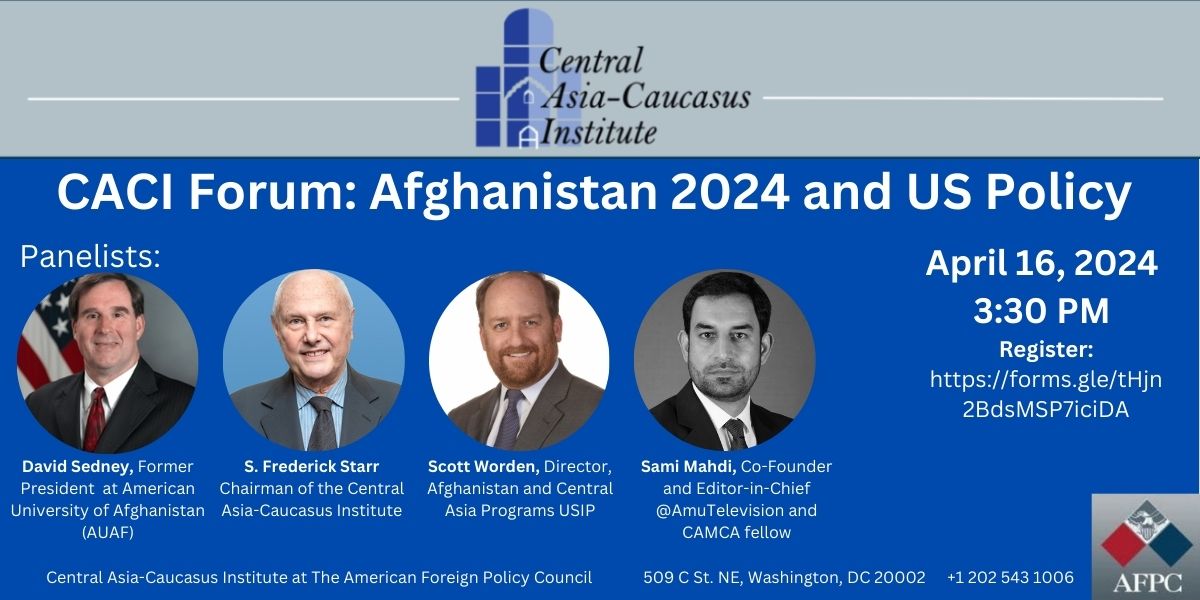Watch: 4/23 Rumsfeld CAMCA Spring '24 Fellows Presentation: Advancing Digital Interconnectivity in CAMCA Region
A presentation by the Spring 2024 CAMCA Fellows, focusing on the advancement of digital connectivity in Central Asia, Mongolia, the Caucasus, and Afghanistan. In the interconnected landscape of the CAMCA region, digital connectivity serves as a cornerstone for both economic prosperity and social progress. This event is not merely about enhancing digital infrastructure; it's about fostering deeper connections across the region. The Fellows will delve into how overcoming challenges is crucial for unlocking economic potential, ensuring equitable access, and driving regional integrati
Register for the 2024 CAMCA Conference - June 12-13 - Bishkek, Kyrgyzstan
Register for the annual Central Asia - Mongolia - Caucasus - Afghansitan (CAMCA) Regional Forum scheduled for June 12-13 in Bishkek, Kyrgyzstan. The CAMCA Regional Forum is a non-political and non-partisan Forum established to promote region-wide discussions on means of advancing economic growth and development in the 10 countries of the region: Afghanistan, Armenia, Azerbaijan, Georgia, Kazakhstan, Kyrgyzstan, Mongolia, Tajikistan, Turkmenistan and Uzbekistan. It promotes this goal by fostering dialogue and interaction among rising young leaders from all sectors in the 10 countries of the region, as well as with international leaders and stakeholders. The Forum organizers - the CAMCA Network, Central Asia-Caucasus Institute and the Rumsfeld Foundation - believe that expanded communication and collaboration among talented professionals from a range of fields can significantly contribute to economic, political and social development on both a national and regional basis.
The Forum is a premier opportunity to engage with prominent influencers and leaders in the CAMCA region and to gain firsthand insights on the region’s pulse and latest developments. The Forum’s non-political and non-partisan mission facilitates an environment for open conversation aimed toward the prosperity of the region and its people. The Forum was established as one of the first and only platforms to bring together representatives of the 10 CAMCA countries, spanning from the South Caucasus to Mongolia, to discuss emerging opportunities for regional cooperation and integration. Due to the diverse and impressive pool of participants, the Forum essentially serves as a ‘one-stop shop’ for professionals of all sectors who are interested in regional cooperation and partnerships, as well as for outside nations, businesses and organizations that have an interest in engaging with the region.
Click here for more information and to register.
Watch: 4/16 CACI Forum - Afghanistan 2024 and U.S. Policy
In 2022 the US adopted a policy towards Taliban-ruled Afghanistan that remains in place today. However, much has happened since then, and is happening today. This FORUM, the first of several on Afghanistan today, will bring together the insights of Americans closely involved with Afghan strategy and prominent Afghan emigres now in America. Speakers will address the question "What now for Afghanistan and America?"
PANELISTS:
- David Sedney, Former President at American University of Afghanistan (AUAF)
- S. Frederick Starr, Chairman of the Central Asia-Caucasus Institute
- Scott Worden, Director, Afghanistan and Central Asia Programs United States Institute of Peace (USIP)
- Sami Mahdi, Co-Founder and Editor-in-Chief @AmuTelevisionm and CAMCA fellow
WHEN: April 16, 2024 3:30 PM ET
WHERE: The American Foreign Policy Council - 509 C St. NE, Washington, DC 20002
REGISTER: https://forms.gle/bGdFRF3EHN7tpWBY7
CACI FORUM - Afghanistan: What's Next For The U.S. And The West?
Join us for a hybrid forum co-organized by the CAMCA Forum founders:

Two years after the Taliban gained power in Afghanistan no country has recognized its government and its leadership remains under international sanctions. However, dozens of countries, including Russia and China, have exchanged sub-ambassadorial officials with Kabul. Several international projects are underway, and donors still provide Afghanistan with millions of dollars for humanitarian purposes—all this as Taliban rulers continue to impose severe restrictions targeting girls, women, and minorities, and brutally crack down on all forms of dissent.
You are invited to join a panel discussion that will assess the current challenges facing the U.S. and its partners in dealing with Taliban-ruled Afghanistan. Topics will include options for alleviating the suffering of the Afghan people without helping their rulers.
Panelists:
Ali Ahmad Jalali, Distinguished Professor, Near East South Asia Center for Strategic Studies, National Defense University
Farishta Sakhi, Project Director, Freedom House; CAMCA Network Member
Scott Worden, Director, Afghanistan and Central Asia Programs, United States Institute of Peace
Sami Mahdi, Editor-in-Chief, Amu TV; CAMCA Network Member
Moderator: S. Frederick Starr, Chairman, Central Asia-Caucasus Institute at the American Foreign Policy Council
When: Tuesday August 15, 2023 from 3:30-5:00 PM EST. Registration and light refreshments begin at 3:00 PM.
Where: American Foreign Policy Council, 509 C Street, NE, Washington, DC 20002 and via Zoom
This email address is being protected from spambots. You need JavaScript enabled to view it. to register to attend in-person.
Click here to register to attend via Zoom.
Spring 2023 CAMCA Fellow Presentation: Ripples from Russia's War in Ukraine in the CAMCA Region
Join the spring 2023 Rumsfeld Foundation's Central Asia, Mongolia, the Caucasus and Afghanistan (CAMCA) fellows for a presentation on the regional economic and political implications of Russia's war in Ukraine. Speakers will examine various strategies to better protect their sovereignty, independence and territorial integrity and improve conditions for further economic development. Register for this in-person event to discuss these issues and learn why the U.S. should support the CAMCA countries in this challenging international environment.
Moderator: S. Frederick Starr, Chairman, Central Asia-Caucasus Institute at theAmerican Foreign Policy Council
When: Tuesday April 25, 2023 - 3:00-4:30 PM EST
Where: American Foreign Policy Council, 509 C Street, NE, Washington, DC 20002


